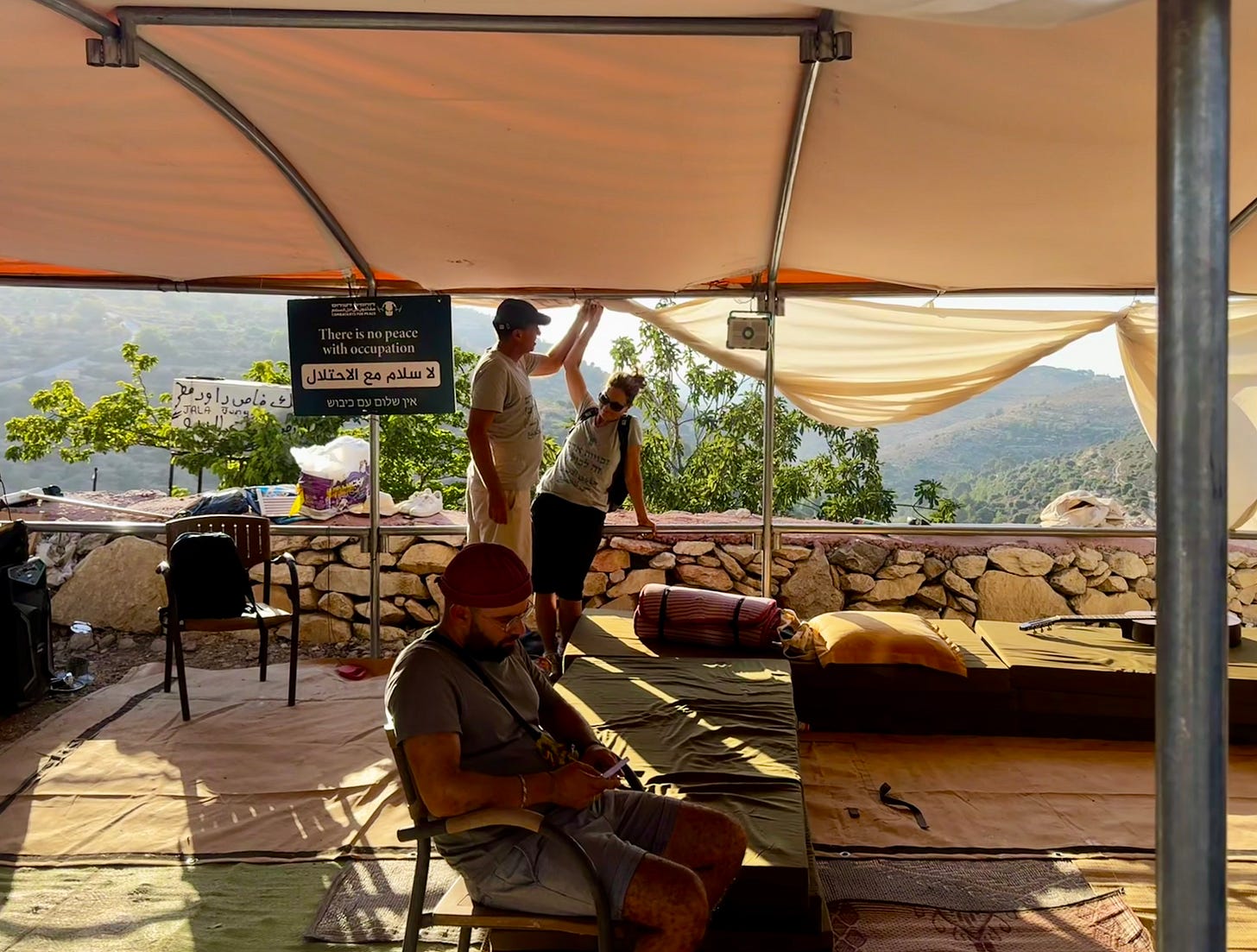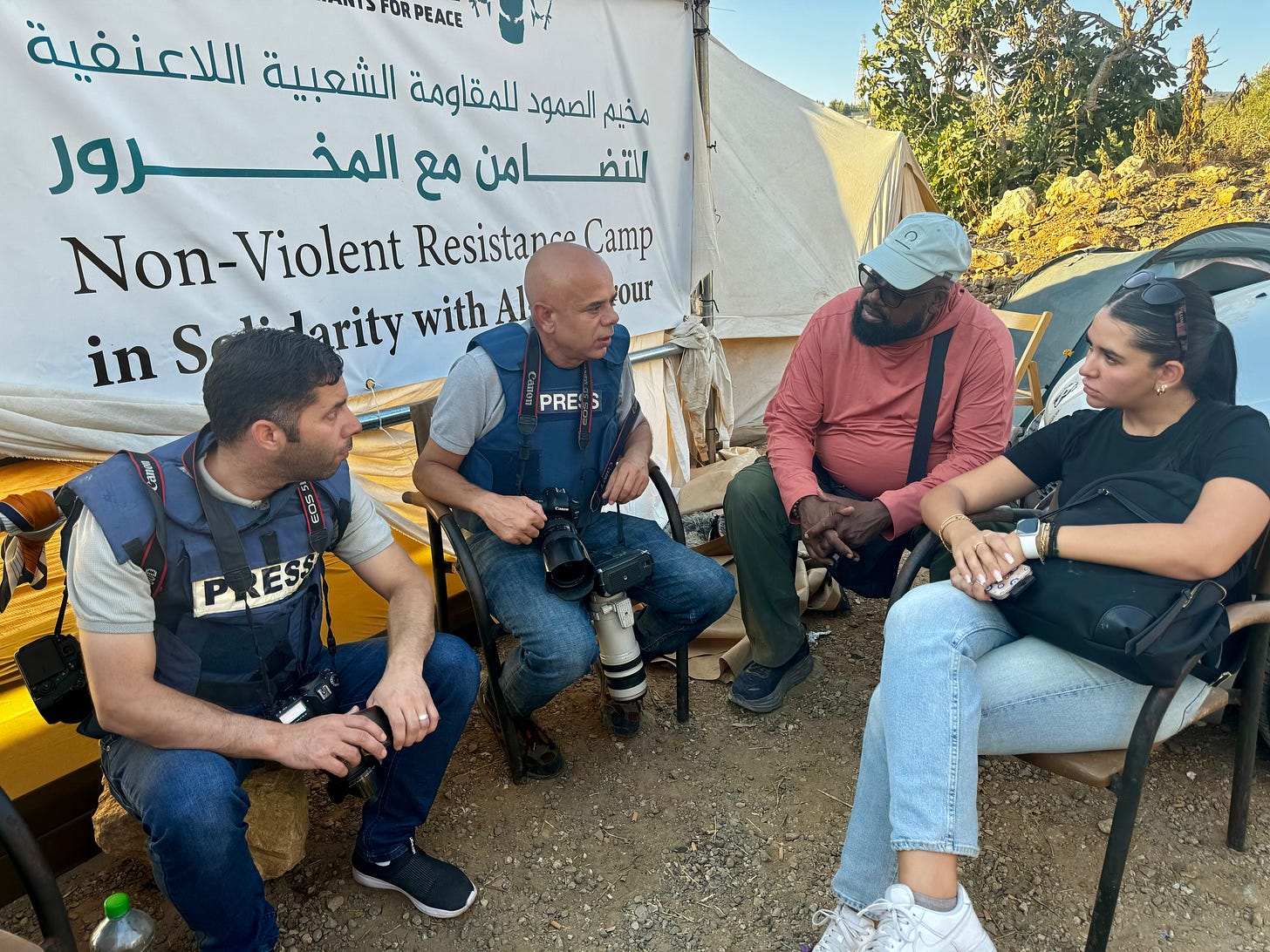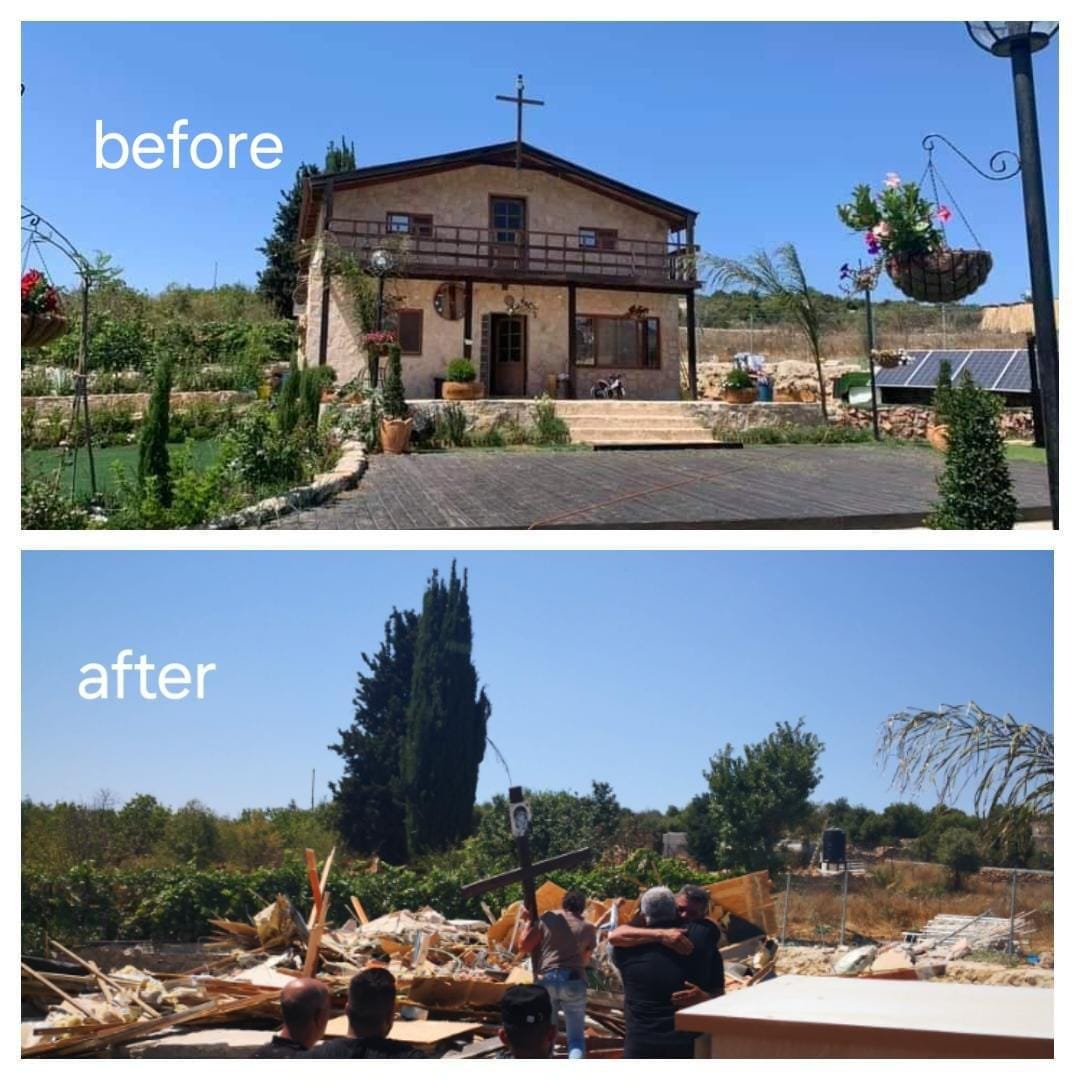Alice’s Restaurant: variations on a theme
One Palestinian Christian family’s story of demolition and eviction in the endangered Makhrour valley near Bethlehem
This is Alice Kisiya, whose image confronting an Israeli settler has filled my social media feed the past few days.
I met 30-year-old Alice for the first time last week when my delegation of US religious leaders in the Holy Land visited her at the tent where she was staying with her family. A few weeks earlier, on July 31, the Kisiya family had been forcibly expelled from their home by armed Israeli settlers who entered their property and began removing their belongings, telling them to leave. Alice called the Israeli army for help, but the army sided with the settlers, protecting them as they took Alice’s home. They even arrested her brother for protesting.
Why would the army do this? A new settlement over the Makhrour Valley (Nahal Heletz) had just been approved by the Netanyahu regime. To learn more about the background to the Makhrour area and the new settlement, please read this short piece by my friend, the brilliant Dalia Qumsiyeh.
Forced from their home, the Kisiya family set up a large white tent on a hill opposite their property; a public protest to their plight. They have been staying in it ever since. When our delegation visited on August 17th, the tent was filled with sympathetic friends—Israeli and Palestinian activists who’d come to show solidarity, most notably a sizeable cohort of Jewish Israelis from Combatants for Peace.
After Alice and others gave a short interview, our disparate group walked down the hill together towards the Kisiya property, singing and praying, until it was not safe to go any further.
After this event, our delegation ate dinner at one of Beit Jala’s best restaurants just up the street from the Kisiya tent. Shams al Aseel overlooks the beleaguered, beautiful Makhrour Valley, with its ancient farming terraces, gorgeous sunsets and the Kisiya property still visible on the next hill. Some friends from Bethlehem joined us for dinner and lamented the impending loss of Bethlehem’s last green space.
Alice’s arrest
Just a few days after our group returned to the States, Alice appeared all over my newsfeed with fresh images of her facing off with the settlers. She’d struck me as feisty, committed to the justice of her cause, and not easily intimidated, so I was not surprised to see the photos documenting her attempts to return home.
The settlers had moved into the Kisiya property and installed a new gate with a big blue Star of David on it. While this would be outrageous in almost any other context, it is normalized behavior in Israel, where in the Occupied Palestinian Territories, Jewish identity grants one the right to basically steal whatever they want from a Palestinan--whether under the guise of the state, or as an individual. (That’s an oversimplification, but there is enough truth here to make this a true statement that becomes truer each year).
For this attempt, Alice and her mother were both arrested yesterday, August 25. As best as I can make out, her mother was released after a few hours, but Alice was not released from Israeli jail until today.
This story was not new to me.
I first learned of the Kisiya family in the summer of 2019, when their large restaurant on the same property (the family livelihood) was demolished by the Israeli army.

Demolitions like this are common for Palestinians living under Israeli jurisdiction in the West Bank and East Jerusalem. In most areas, they must apply for permits to build anything on their own property and their requests are almost always denied or just ignored for years. (Bear in mind that illegal Jewish settlements are constantly expanding all the time on confiscated land – often right next door to their Palestinians neighbors who are not allowed to even build improvements on their existing structures without risking demolition orders. To add salt into the wound, these demolition orders require the Palestinian to demolish their own home or structure. If they refuse, the army will demolish it for them and send them the bill, which is more expensive than if they demolished it themselves. What would you do if faced with such a choice?)
Five years ago today, the Israeli army demolished Alice’s restaurant. I know this, because I paused while writing this article. While taking a break, I scrolled through my Facebook memories. I think I audibly gasped when I saw my post from 2019, detailing the demolition of the Kisiya restaurant on this day.
August 26, 2019, Alice’s restaurant is demolished and burned.
August 26, 2024, Alice is released from jail after protesting the seizure of her home by settlers.
I remember the restaurant demolition very well. I was in Bethlehem at the time, and everyone was talking about it with pain in their eyes and anger and dread simmering below the surface. The Kisiya restaurant was a local favorite and a popular destination for people who came from as far away as Haifa to eat their delicious barbeque and enjoy the sunset over the valley.
…
Whenever I lead Holy Land tours, I always take my groups hiking through the Makhrour Valley, beneath the Kisiya family’s property. We make our way through the olive groves, the wildflowers and singing birds to the village of Battir, with its ancient Roman waterways and famous eggplants.

This area—from Beit Jala to Battir—is one of my favorite places to spend time when I am in Palestine.
Virtually all the rest of Bethlehem’s greenery and nature has been cut off by the separation wall, or confiscated for settlements, settlement roads, and Israeli military use. So, when I say that the Makhrour Valley is precious to the Palestinians living in the Bethlehem area, it is almost an understatement. It is the literally the LAST place they have left to get outside and rejuvenate in nature, one of the last places they can hike and picnic under the ancient olive trees planted by their ancestors.
It is no secret that the area has been in danger from the ever-encroaching, endlessly-expanding settlements and many of us have been raising the alarm for the past few years.
Five years ago today, I sat at the Jala Jungle restaurant and watched the sun set over the Makhrour Valley, over the demolished ruins of Alice’s Restaurant, and I cried for this family I’d never met. It felt like a noose was closing in over the whole area. Today it feels even tighter.
Here we are five years later, with not only the restaurant destroyed, but the Kisiyeh family evicted. Battir and many other places in the area are endangered, free access to the valley is disappearing, and the beginnings of the new settlement are materializing.
Unless….
Unless something happens—divine and human intervention working together.
“Why do you pray if you are not willing to do something about the problem? Such prayers are empty” said a Palestinian friend on this same trip. Familiar words but they struck me as so profound, as though it was a new concept, a golden key.
In Palestine, the pull of Israel’s military gravity is strong. No matter how much strength, effort, ingenuity, education, and nonviolent resistance is put against the force of of its gravity, it seems (for the moment at least) to be stronger. It pulls and drags down everything that is in the way of their dreams—that is, everything that is Palestinian. Property, freedom, homes, schools, lands gardens, water, and futures are pulled down, down, down. Palestine is weaker and Israel is stronger so Israel does what it wants. Israel crushes what it wants. Israel takes what it wants. To stand as a Palestinian against the Israeli system, unrelenting in its gobbling of everything it can, unrelenting in its harsh punishment of anyone who stands in their way, is to exert all the strength of body, soul and spirit and still finally find oneself crushed beneath the wheels of a machine.
And yet, that is not totally true.
Crushed—and yet not crushed. Not totally. Persecuted by humans but not abandoned by God. Struck down but not destroyed. That’s Palestine. (And in his grace that is Israel too).
I see it in Alice and so many others. I see it also in the Israelis who are working hard for justice in their land. These people carry something in their bones that cannot be extinguished.
The tiny gravity of a militarized, upside down world cannot last forever. There’s a bigger force out there, inverting and subverting all that is not righteousness, peace and joy in the Holy Spirit, turning all things right-wise, and in the end causing the gravitational pull to work in the exact opposite direction, so that what was once driven into the ground now rises, and what once seemed to rise now falls (only so that it can learn to truly rise). This bigger force is, of course, love. Christ’s restoring love and compassion for all He has made.
I can’t see what I saw without telling the story. And I cannot tell this story without adding my prayers to it, prayers for Alice and her family and all the vulnerable Palestinians whose security needs no one ever talks about. And my prayers also for those who take things that are not theirs, those who drive the wrecking balls into someone else’s house. Maybe even more so, my prayers are for them. May God have mercy.
But let’s do more than pray with our lips. Let our actions also become a kind of prayer. Let’s stand with this family by sharing their story and doing what we can to support them in this struggle. To stay in touch with this story:
Follow Alice Kisiya here
Follow Combatants for Peace here













This is heart-breaking, Mercy. And indignation and outrage are our natural reactions...and yet we are called to pray FOR our enemies. How very challenging that is. May God bless and protect these victims of wickedness and evil-doing. May love have the final word.
Thieves will always be thieves. Standing before God, they will not escape their worldly actions - and karma is a real b****!